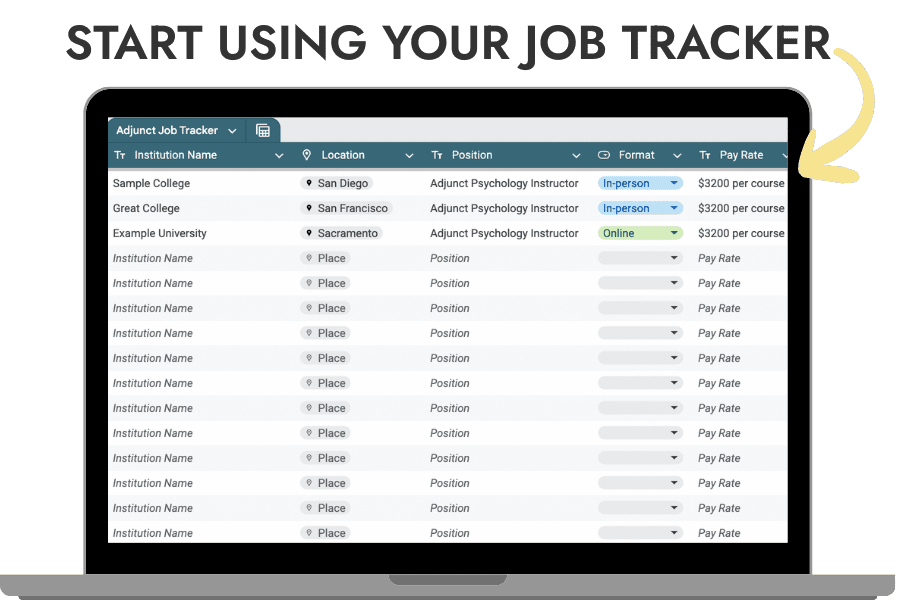
How to Get an Adjunct Job (+ Application Checklist)
September 5, 2025
Did you know that nearly half of all college courses in the U.S. are taught by adjuncts? It’s true. And if you have a graduate degree (even one that’s been sitting on a shelf collecting dust), you may already be qualified to teach college courses, even if you’ve never taught before. Colleges rely heavily on people with graduate degrees to teach across nearly every field.
If you’ve been wondering how to get an adjunct job, sharing what you know, and getting paid for it, adjunct teaching could be a great fit. The challenge is knowing where to start. This post will give you a clear picture of what colleges are looking for, what materials you’ll need, and how you can stand out as a strong candidate.
Inside:
How to Get an Adjunct Job: Key Things to Know
Where to Look
Adjunct jobs aren’t always listed on the big job boards. While you might find a few on sites like Indeed or HigherEdJobs, most openings are posted directly on a college’s HR portal or departmental webpage. If you only stick to the big boards, you’ll miss many of the real opportunities.
What Colleges Want
Your teaching résumé, usually called a curriculum vitae or CV, should look different from a standard corporate résumé. Focus on highlighting teaching, tutoring, mentoring, or subject-area expertise first. A clear, academic-style CV instantly signals that you’re ready to step into a classroom.
Portfolio Basics
Many universities expect a teaching portfolio, but it doesn’t need to be overwhelming. Most often, this includes a teaching philosophy statement, past teaching evaluations, and sometimes a sample syllabus or assignment. Keep everything clear, professional, and tailored to your subject area.
The Chair Connection
Hiring decisions often rest with the department chair, not HR. Communicating directly and professionally with them (especially if you already have your materials ready) can get your name to the top of the list.
Confidence in the Process
Preparation is what sets you apart. That means knowing:
- Your availability (earliest class times, latest times you can teach)
- Which courses you can teach immediately (using the department’s numbering system)
- How you’d approach a sample teaching demonstration if asked
Having these answers at the ready shows that you’re not only qualified but dependable.
Adjunct Job Application Checklist
Before you start applying, here’s what you’ll need to gather:
✅ Updated CV tailored for teaching (not just your typical résumé)
✅ Teaching philosophy statement (1–2 pages)
✅ Sample syllabus or course outline (optional, but often requested by universities)
✅ Cover letter that speaks directly to the department’s needs
✅ List of references (academic or professional)
✅ Transcript copies (unofficial are usually fine at first)
✅ Professional email template to reach out to department chairs
✅ Teaching evaluations, if you have them. These usually come in two forms:
-Student evaluations: End-of-semester feedback forms completed by your students.
-Faculty/administrative evaluations: Classroom observations or performance reviews completed by another instructor, chair, or dean.
Having these pieces ready puts you miles ahead of other applicants.
Help With Your Adjunct Job Application
If this checklist feels overwhelming, you’re not alone. Most first-time applicants waste weeks trying to reinvent the wheel or starting from scratch. That’s exactly why I created my course: Get Hired as an Adjunct in 30 Days.
Inside, I share the exact steps I’ve used to land every adjunct job I’ve applied for, plus templates and examples that make the process faster and less stressful. You’ll find:
- CV and cover letter templates
- A teaching philosophy template
- Sample syllabus and assignments
- Tips to prepare for interviews and teaching demos
- A system to help you track and organize applications
You don’t have to start from scratch. You can follow a system that’s been proven to work.
👉 Join the waitlist here to be the first to know when enrollment opens. As a bonus, when you join the waitlist, you’ll also get my free Adjunct Job Tracker to keep your applications organized.
If You’re Nervous About Teaching…
Most new adjuncts feel a mix of excitement and nerves when they think about stepping into a classroom for the first time. The truth is, no one feels 100% ready before they start. Confidence comes from preparation, support, and having a few proven strategies to lean on.
If you’d like a little extra encouragement and practical tips fo thriving in your first adjunct role, consider joining my newsletter. You’ll get ongoing advice, tools, and insights to make the process less overwhelming and more doable.
With 14 years of experience teaching at colleges and universities, I help adjunct instructors land their first job and thrive in the classroom.
Hi, I'm Christina
YOUR GUIDE TO ALL THINGS ADJUNCT
Thinking of Teaching College?
Join the newsletter for job search tips, time-saving teaching tools, and honest insight from a seasoned adjunct instructor.
Thank you!
You're on the list!
No SPAM. Just honest advice & helpful tools.
JOIN THE NEWSLETTER!
Whether you're exploring adjuncting, applying for jobs, or already teaching, you're in the right place.
